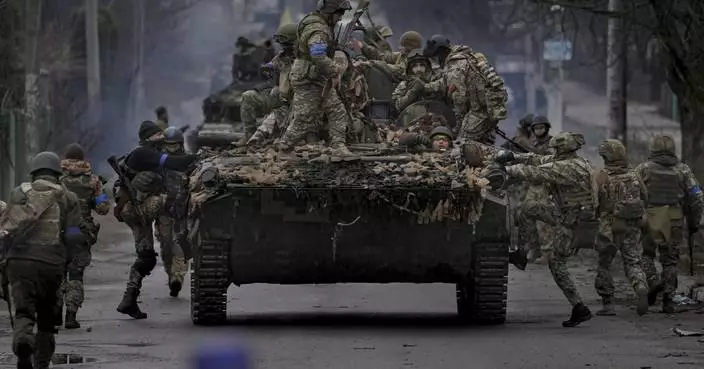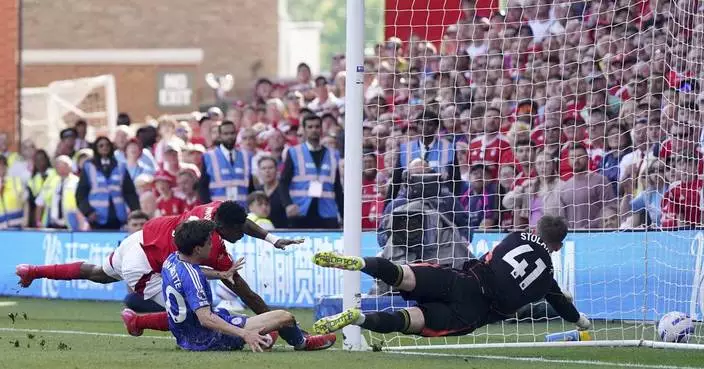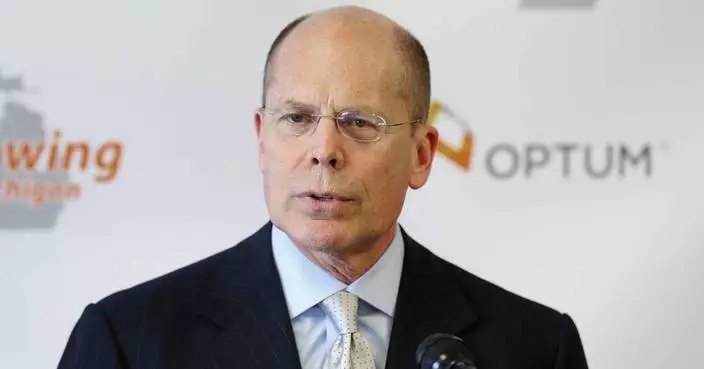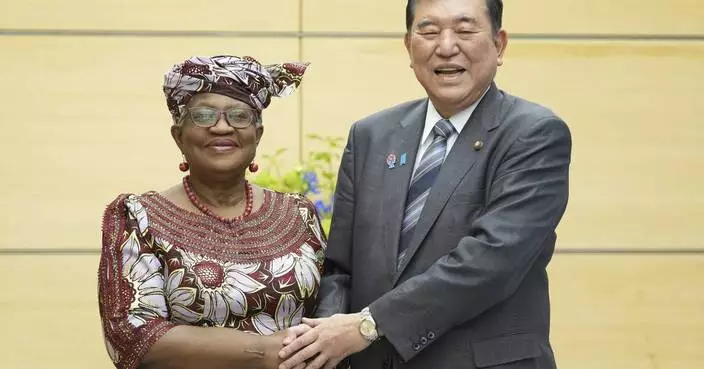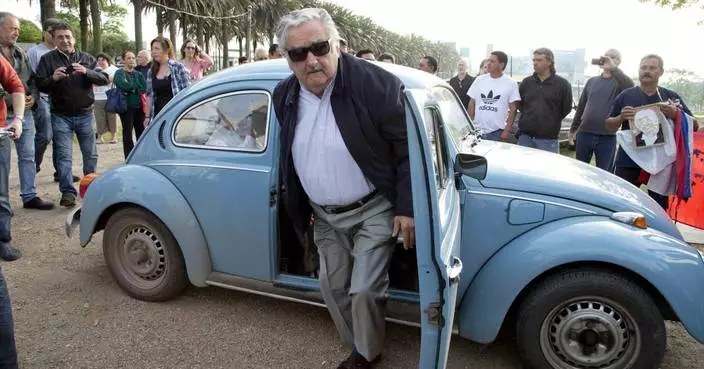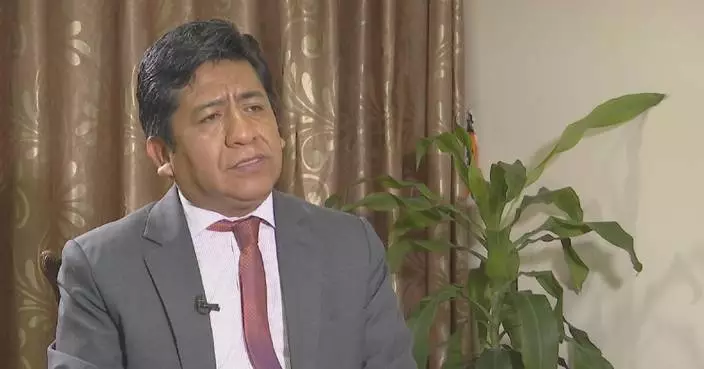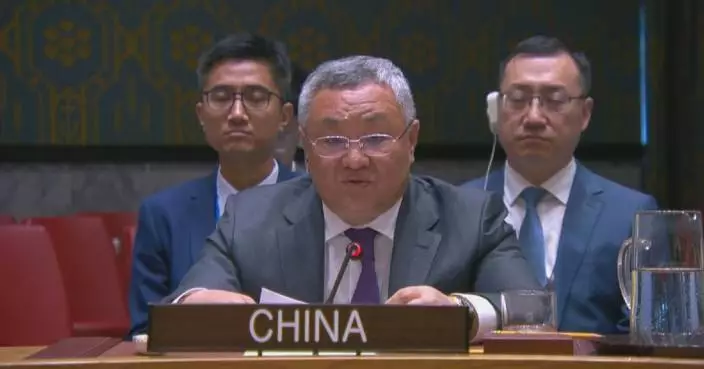After winning two Olympic gold medals, Yuzuru Hanyu wants to master a quadruple axel.
Hanyu, who at the Pyeongchang Games became the first man to repeat as Olympic champion in 66 years, told a news conference on Tuesday he hoped to be the first, or at least one of the first figure skaters to accomplish the 4 1/2 revolutions in competition.

Japanese figure skater and gold medalist Yuzuru Hanyu speaks in Tokyo, Tuesday, Feb. 27, 2018, a day after returning home from Pyeongchang. (AP Photo/Shizuo Kambayashi)
"No one in competition has achieved successful quadruple axel jumps and there are very few people actually practicing even during training," Hanyu said. "I want to continue my challenge towards achieving my dream of successfully performing the quad axel, even if I may not be the first person to do so."
The usually articulate Hanyu struggled with questions at the Foreign Correspondent's Club of Japan, where he was asked to describe how difficult the jump is and to show something of it.
He dropped his head to the podium, and said a quadruple axel is like jumping rope four times while revolving twice with one's eyes closed.
Even though top skaters have achieved success in five of the six quadruple jump varieties, only a few are practicing the more difficult quadruple axel, which requires an additional half-turn, he said.
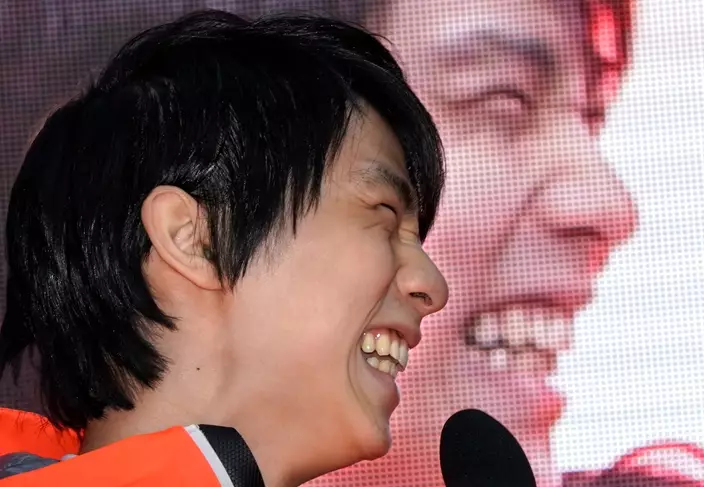
Japanese figure skater and gold medalist Yuzuru Hanyu laughs while speaking in Tokyo, Tuesday, Feb. 27, 2018, a day after returning home from Pyeongchang. (AP Photo/Shizuo Kambayashi)
Asked if he would go beyond that, Hanyu said he was interested.
Scientists say humans can go as far as quintuple, Hanyu said, and his childhood coach is encouraging him to go for it.
"I would like to give it a try in the future, if possible," he said. "A quintuple and half could be beyond my reach though."
He says those difficult jumps add to the artistry of a performance only when performed with excellent basic technique.
Hanyu, who was off ice until January while recovering from a right ankle injury, said his gold medal in Pyeongchang was not easily won. The pain in the ankle was still only "20 to 30 percent" down from the worst.
"I bet my life for this gold medal," the 23-year-old Hanyu, who returned home on Monday, told the packed news conference. "I am alive and here," he joked, "I am not dying."

Japanese figure skater Yuzuru Hanyu shows off his gold medal he got in the Pyeongchang Olympics while speaking in Tokyo, Tuesday, Feb. 27, 2018, a day after returning home. (AP Photo/Shizuo Kambayashi)
Hanyu said he was proud to have repeated as champion in a sport traditionally dominated by Europeans.
"I believe it was a historic step forward that I was able to win the gold medal using Japanese music for my program," he said.
Conscious of his Japanese fans, Hanyu said he always eats rice to get energy for competition, instead of bread or pasta. But when he is not competing, he eats like most other youths and says he still stays in shape: "I go to McDonalds, I like carbonated soft drinks, and I even eat potato chips sometimes."
CANNES, France (AP) — Three years after flying into the Cannes Film Festival with “Top Gun: Maverick,” Tom Cruise again kicked up a storm on the Croisette with Wednesday's premiere of “Mission: Impossible — Final Reckoning.”
Christopher McQuarrie's latest “Mission: Impossible” installment was the biggest Hollywood tentpole wading ashore in Cannes this year. It, and Cruise, stirred a frenzy at the French Riviera festival, which again played eager host to the American movie star.
Just his arrival outside the premiere, beamed onto the screen in the Grand Théâtre Lumière, drew a response. When Cruise stepped out his car, oohs and applause reverberated through the theater. Cruise spent several minutes signing autographs for fans lined up on the Croisette.
Some had wondered whether Cruise might make a more daring arrival. When Cruise received an honorary Palme d’Or from the festival in 2022, the “Top Gun: Maverick” premiere included an impressively timed jet flyover. Instead, on Day 2 of the festival, he and the film’s cast walked the red carpet accompanied by an orchestra performing Lalo Schifrin's “Mission: Impossible” theme on the Palais steps. “Bravo!” cheered Cruise.
Though selfies are frowned upon on the Cannes red carpet, McQuarrie took several of the group, which included Hayley Atwell, Simon Pegg, Angela Bassett and Hannah Waddingham.
“Final Reckoning,” the eighth “Mission: Impossible” movie and a follow-up to 2023's “Mission: Impossible — Dead Reckoning Part One,” is again a heaping serving of outlandish stunts in a globe-trotting, world-saving plot that greatly relies on Cruise's sheer force of will to propel it.
The film, which draws to a close McQuarrie's extended AI apocalypse tale, drew mostly good reviews following its screening and garnered a five-minute standing ovation.
“To be here in Cannes and have these moments, as a kid when we were growing up, I really can't even dream about something like this happening,” Cruise said, addressing the audience. “I'm very grateful for 30 years to be able to entertain you with this franchise.”
Throughout much of the “Mission: Impossible” parade in Cannes, Cruise and McQuarrie lavished praise upon one another. Cruise told McQuarrie, who took over directing the franchise with 2015's “Rogue Nation” that he looked forward to making “a bunch of other kind of movies with you.”
“When I was a kid growing up, I was one of those kids who didn't quite fit in. A lot of my life was imaginative play,” said McQuarrie. “And I got to grow up and have my very own action figure, who was actually willing to do just about every crazy thing I could think of.”
Earlier in the day, Cruise joined McQuarrie midway through the director's masterclass talk. There was no press conference for the film, which meant Cruise and company faced no questions from reporters. But Cruise's surprise appearance allowed the 62-year-old star a moment to reflect on his 30 years with “Mission: Impossible.” As to whether “Final Reckoning” is a last hurrah for him, he demurred, calling it “the culmination of three decades of work.”
“I’d rather just people see it and enjoy,” Cruise said.
Cruise, to no one's surprise, said he relishes the stunt work in “Mission: Impossible.”
“I don’t mind encountering the unknown. I like the feeling. It’s just an emotion for me. It’s something that is not paralyzing,” Cruise said.
Cruise, McQuarrie and Paramount Pictures, which will release “Final Reckoning” in North American theaters on May 23, are hoping the installment returns the franchise to box-office heights.
“Dead Reckoning Part One” was considered a box-office disappointment, though it ultimately grossed $571.1 million worldwide. Still, with production budgets close to $300 million for these films, a lot is riding on “Final Reckoning.” Cruise has been traversing the world — with stops in Japan, South Korea and England in the run-up to Cannes — to drum up excitement. Paramount chief executive Brian Robbins also attended the Cannes premiere.
Cruise and McQuarrie, as they did around the release of “Top Gun: Maverick” (which McQuarrie co-wrote and produced), have made themselves passionate pitchmen for the big-screen experience. McQuarrie on Wednesday granted: “I worry for the fate and survival of cinema.”
“Streaming is in danger of driving the industry into extinction,” said McQuarrie. “The advantage a filmmaker has entering the world is that he doesn’t have the pressure of an opening weekend.”
For more coverage of the 2025 Cannes Film Festival, visit https://apnews.com/hub/cannes-film-festival.
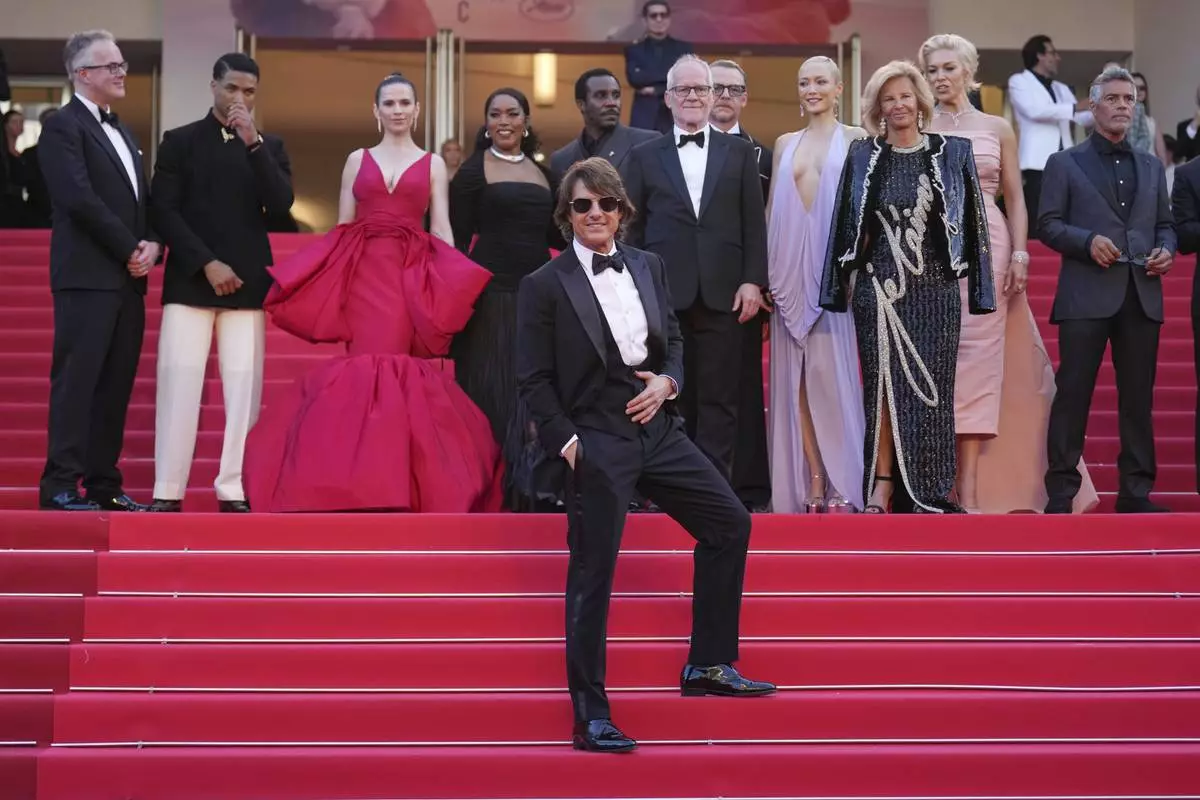
Tom Cruise, front, editor Eddie Hamilton, from back left, Greg Tarzan Davis, Hayley Atwell, Angela Bassett, Tramell Tillman, festival director Thierry Fremaux, Simon Pegg, Pom Klementieff, Iris Knobloch, Hannah Waddingham and Esai Morales pose for photographers upon arrival at the premiere of the film 'Mission: Impossible - The Final Reckoning' at the 78th international film festival, Cannes, southern France, Wednesday, May 14, 2025. (AP Photo/Natacha Pisarenko)

Greg Tarzan Davis, from left, Hayley Atwell, Angela Bassett, Tom Cruise, Tramell Tillman, director Christopher McQuarrie, Hannah Waddingham, Simon Pegg and Pom Klementieff pose for photographers upon arrival at the premiere of the film 'Mission: Impossible - The Final Reckoning' at the 78th international film festival, Cannes, southern France, Wednesday, May 14, 2025. (Photo by Scott A Garfitt/Invision/AP)

Writer Erik Jendresen, from left, Tramell Tillman, Simon Pegg, Angela Bassett, Pom Klementieff, Tom Cruise, director Christopher McQuarrie and Hayley Atwell pose for photographers upon arrival at the premiere of the film 'Mission: Impossible - The Final Reckoning' at the 78th international film festival, Cannes, southern France, Wednesday, May 14, 2025. (Photo by Joel C Ryan/Invision/AP)
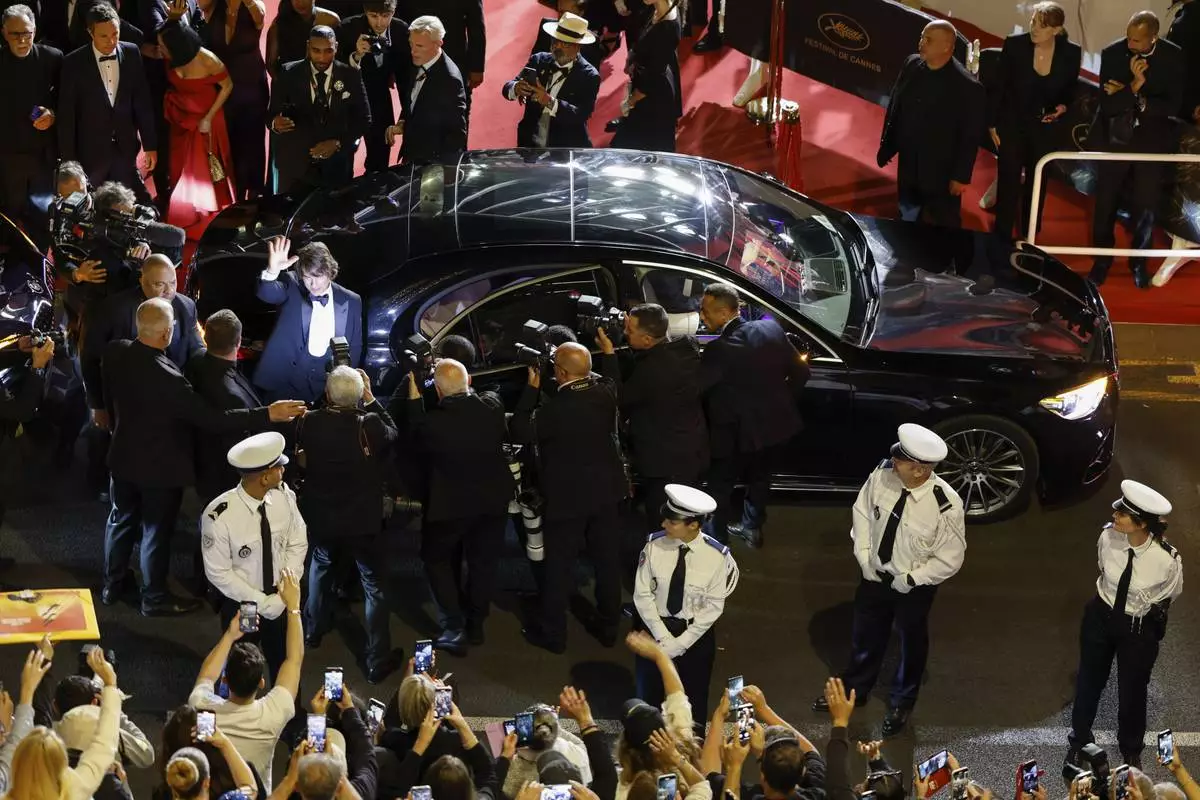
Tom Cruise waves to fans upon departure from the premiere of the film 'Mission: Impossible – The Final Reckoning' at the 78th international film festival, Cannes, southern France, Wednesday, May 14, 2025. (Photo by Millie Turner/Invision/AP)

Tom Cruise poses for photographers upon departure from the premiere of the film 'Mission: Impossible – The Final Reckoning' at the 78th international film festival, Cannes, southern France, Wednesday, May 14, 2025. (AP Photo/Natacha Pisarenko)

Hayley Atwell, from left, Greg Tarzan Davis, Angela Bassett, Tom Cruise, and Pom Klementieff pose for photographers upon departure from the premiere of the film 'Mission: Impossible – The Final Reckoning' at the 78th international film festival, Cannes, southern France, Wednesday, May 14, 2025. (AP Photo/Natacha Pisarenko)

Tom Cruise poses for photographers upon departure from the premiere of the film 'Mission: Impossible – The Final Reckoning' at the 78th international film festival, Cannes, southern France, Wednesday, May 14, 2025. (Photo by Lewis Joly/Invision/AP)
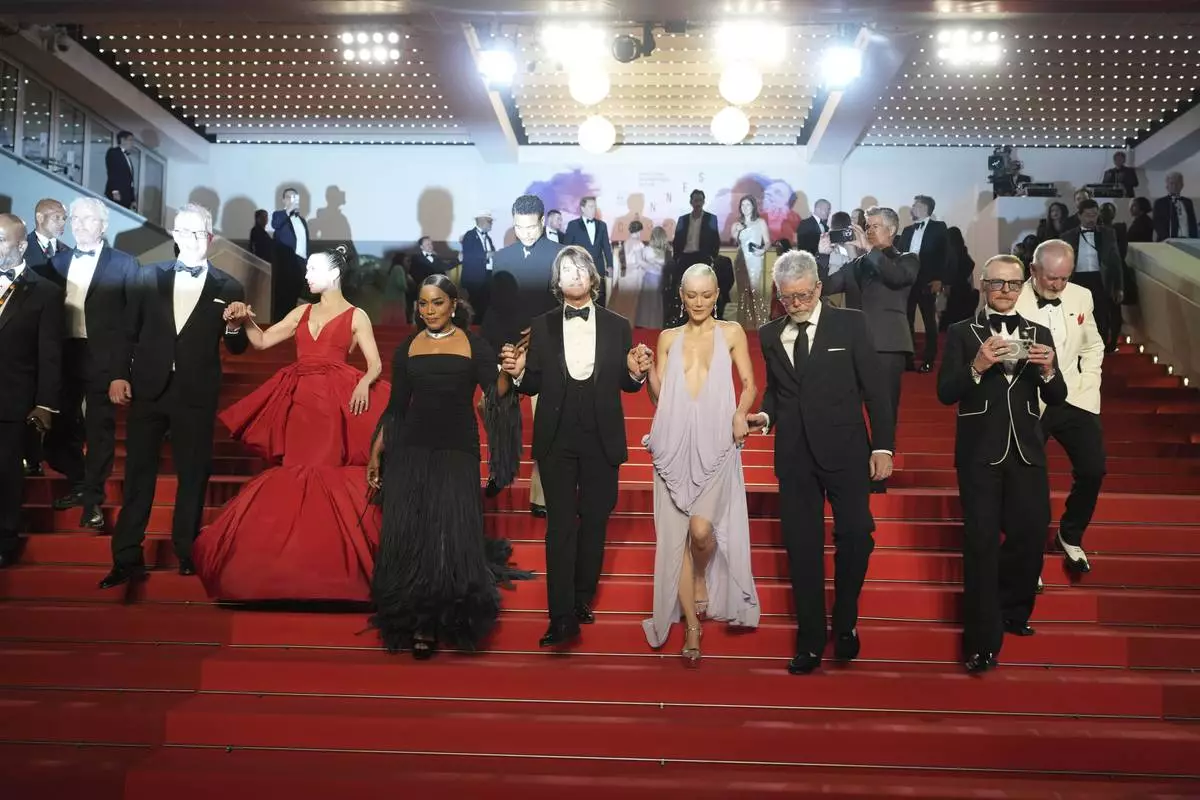
Editor Eddie Hamilton, from left, Hayley Atwell, Angela Bassett, Tom Cruise, Pom Klementieff, director Christopher McQuarrie, Simon Pegg and writer Erik Jendresen pose for photographers upon departure from the premiere of the film 'Mission: Impossible – The Final Reckoning' at the 78th international film festival, Cannes, southern France, Wednesday, May 14, 2025. (AP Photo/Natacha Pisarenko)

Tom Cruise upon departure from the premiere of the film 'Mission: Impossible – The Final Reckoning' at the 78th international film festival, Cannes, southern France, Wednesday, May 14, 2025. (AP Photo/Natacha Pisarenko)

Tom Cruise poses for photographers upon arrival at the premiere of the film 'Mission: Impossible - The Final Reckoning' at the 78th international film festival, Cannes, southern France, Wednesday, May 14, 2025. (Photo by Joel C Ryan/Invision/AP)
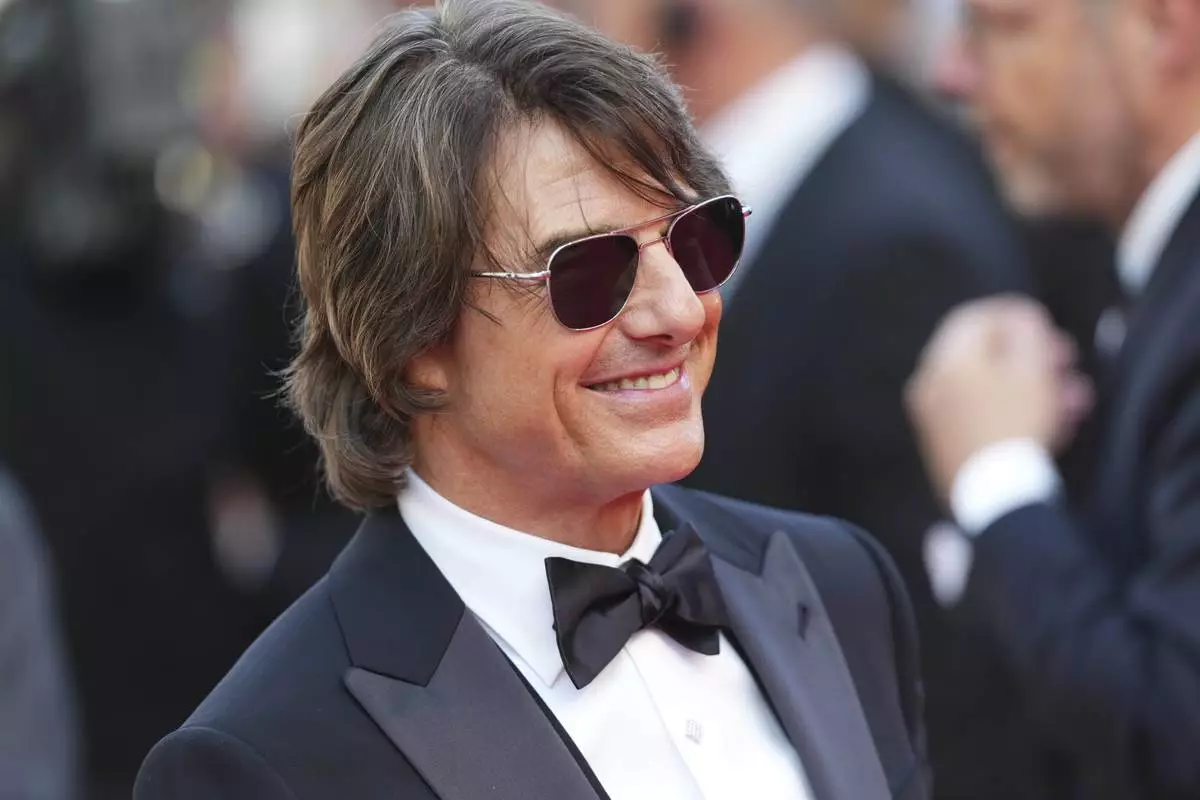
Tom Cruise poses for photographers upon arrival at the premiere of the film 'Mission: Impossible - The Final Reckoning' at the 78th international film festival, Cannes, southern France, Wednesday, May 14, 2025. (Photo by Lewis Joly/Invision/AP)
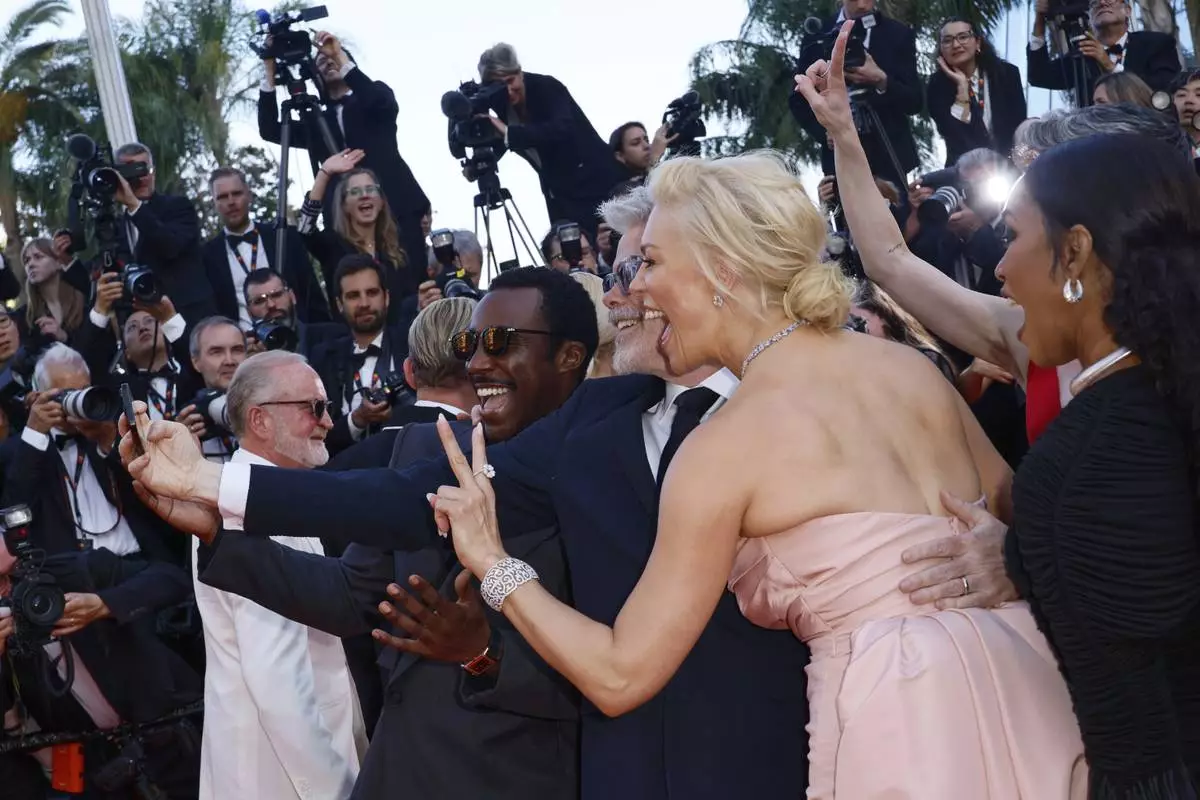
Tramell Tillman, from left, director Christopher McQuarrie, Hannah Waddingham, and Angela Bassett take a selfie upon arrival for the premiere of the film 'Mission: Impossible - The Final Reckoning' at the 78th international film festival, Cannes, southern France, Wednesday, May 14, 2025. (Photo by Joel C Ryan/Invision/AP)
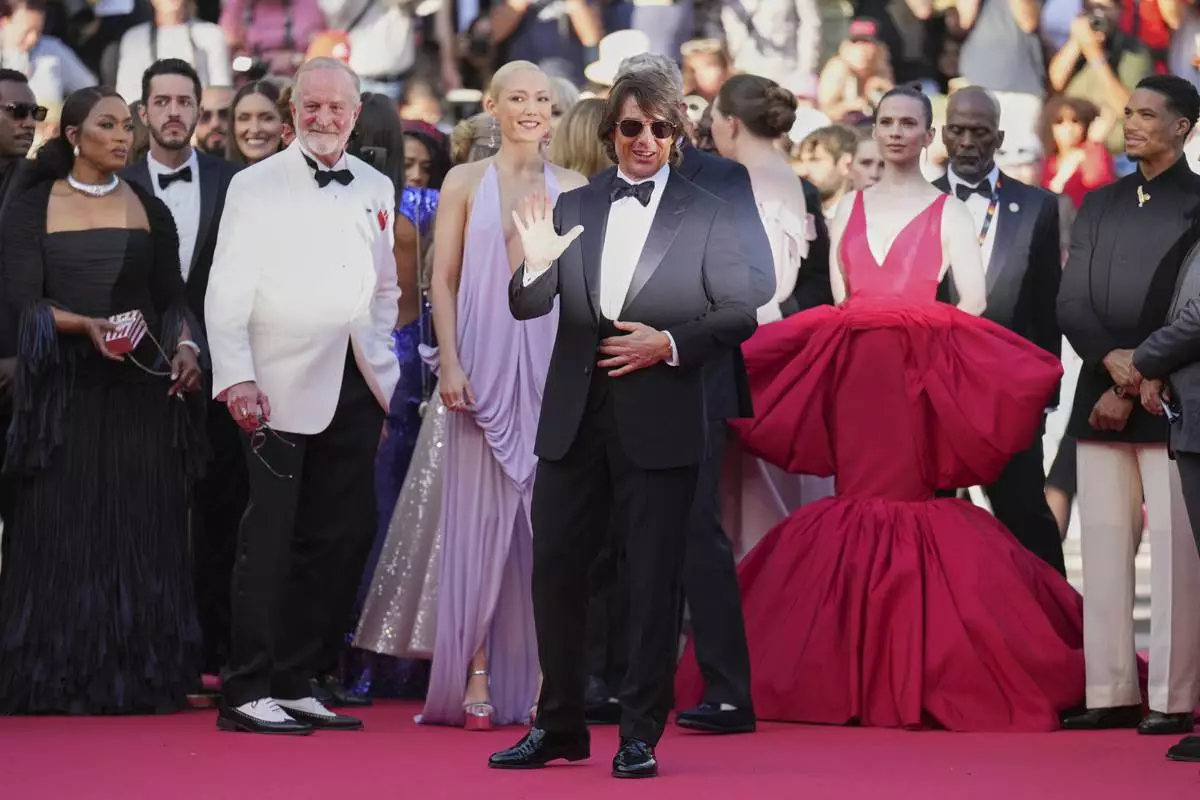
Angela Bassett, from left, writer Erik Jendresen, Pom Klementieff, Tom Cruise, Hayley Atwell, and Greg Tarzan Davis pose for photographers upon arrival at the premiere of the film 'Mission: Impossible - The Final Reckoning' at the 78th international film festival, Cannes, southern France, Wednesday, May 14, 2025. (AP Photo/Natacha Pisarenko)

Greg Tarzan Davis, from left, editor Eddie Hamilton, Angela Bassett, Tramell Tillman, Tom Cruise, director Christopher McQuarrie, Hannah Waddingham, Simon Pegg, Esai Morales, and Pom Klementieff take a selfie upon arrival at the premiere of the film 'Mission: Impossible - The Final Reckoning' at the 78th international film festival, Cannes, southern France, Wednesday, May 14, 2025. (Photo by Scott A Garfitt/Invision/AP)
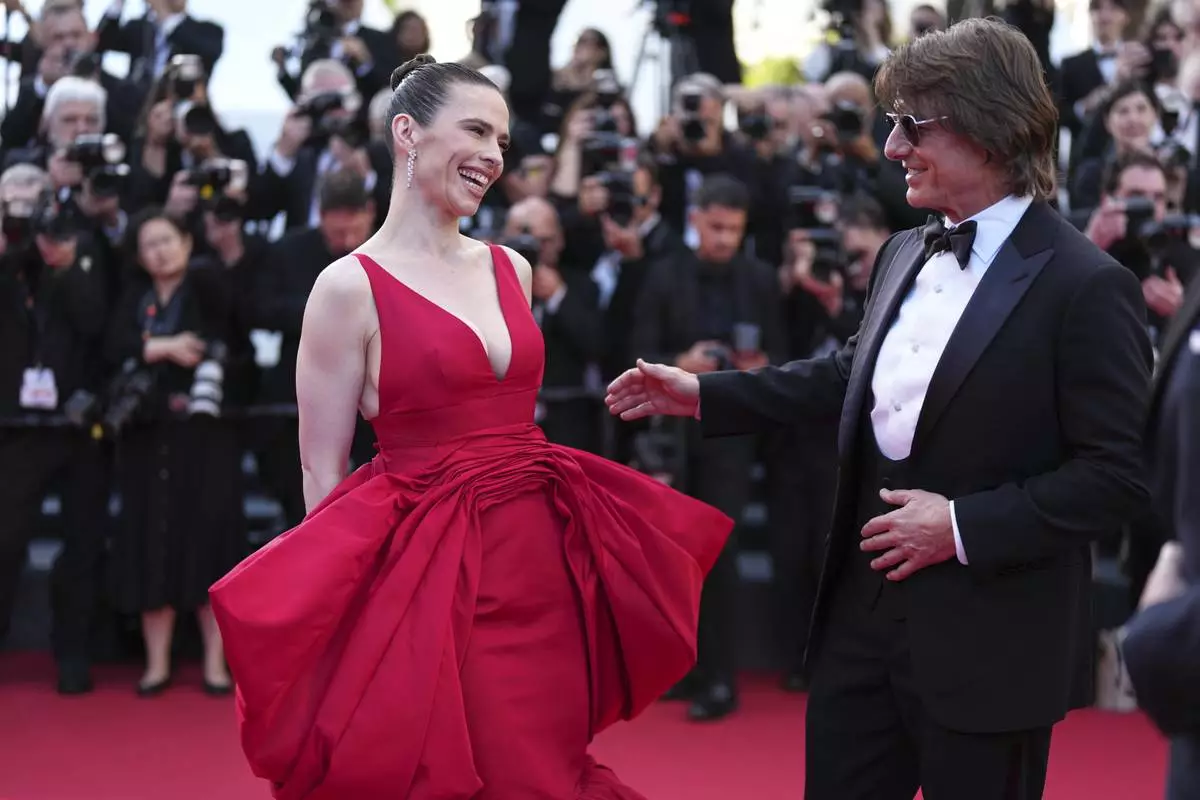
Hayley Atwell, left, and Tom Cruise pose for photographers upon arrival at the premiere of the film 'Mission: Impossible - The Final Reckoning' at the 78th international film festival, Cannes, southern France, Wednesday, May 14, 2025. (Photo by Scott A Garfitt/Invision/AP)
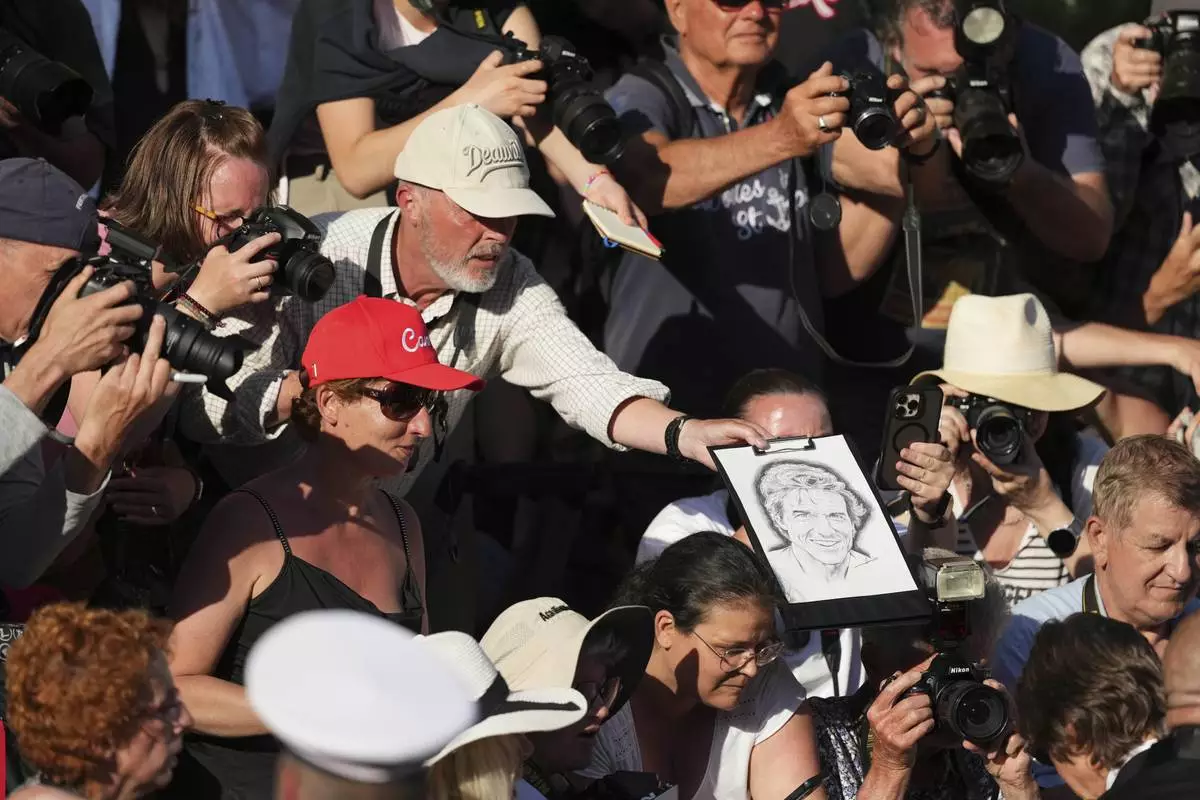
Tom Cruise, bottom right, signs autographs upon arrival for the premiere of the film 'Mission: Impossible - The Final Reckoning' at the 78th international film festival, Cannes, southern France, Wednesday, May 14, 2025. (Photo by Lewis Joly/Invision/AP)

Greg Tarzan Davis, from left, Hayley Atwell, Tom Cruise, and Pom Klementieff pose for photographers upon arrival at the premiere of the film 'Mission: Impossible - The Final Reckoning' at the 78th international film festival, Cannes, southern France, Wednesday, May 14, 2025. (Photo by Scott A Garfitt/Invision/AP)

Hannah Waddingham poses for photographers during the photo call for the film 'Mission: Impossible – The Final Reckoning' at the 78th international film festival, Cannes, southern France, Wednesday, May 14, 2025. (Photo by Scott A Garfitt/Invision/AP)
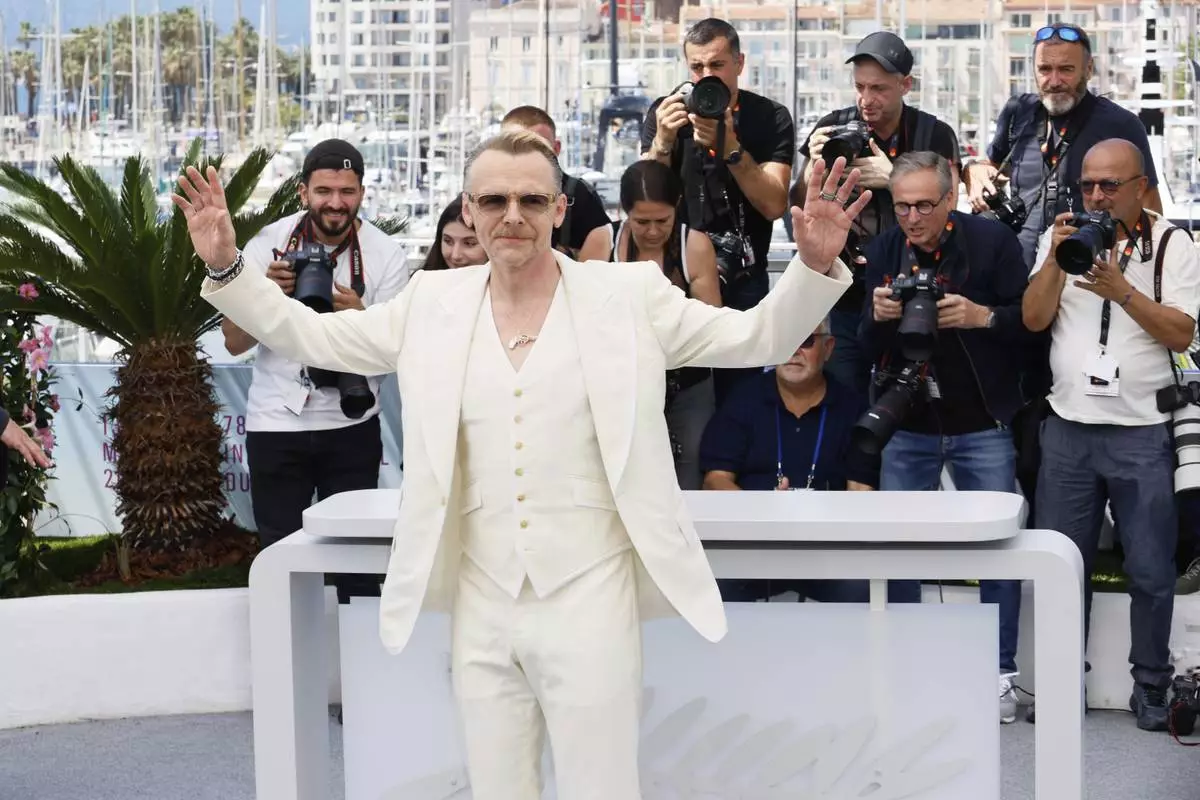
Simon Pegg poses for photographers during the photo call for the film 'Mission: Impossible – The Final Reckoning' at the 78th international film festival, Cannes, southern France, Wednesday, May 14, 2025. (Photo by Joel C Ryan/Invision/AP)

Tom Cruise poses for photographers during the photo call for the film 'Mission: Impossible – The Final Reckoning' at the 78th international film festival, Cannes, southern France, Wednesday, May 14, 2025. (Photo by Joel C Ryan/Invision/AP)

Tom Cruise, left, and director Christopher McQuarrie pose for photographers during the photo call for the film 'Mission: Impossible – The Final Reckoning' at the 78th international film festival, Cannes, southern France, Wednesday, May 14, 2025. (Photo by Scott A Garfitt/Invision/AP)

Tom Cruise poses for photographers during the photo call for the film 'Mission: Impossible – The Final Reckoning' at the 78th international film festival, Cannes, southern France, Wednesday, May 14, 2025. (Photo by Joel C Ryan/Invision/AP)

Greg Tarzan Davis, from left, Angela Bassett, Hannah Waddingham, Tom Cruise, director Christopher McQuarrie, Hayley Atwell, Simon Pegg, Pom Klementieff, Esai Morales, and Tramell Tillman pose for photographers during the photo call for the film 'Mission: Impossible – The Final Reckoning' at the 78th international film festival, Cannes, southern France, Wednesday, May 14, 2025. (Photo by Joel C Ryan/Invision/AP)

Pom Klementieff, from left, Angela Bassett, Tom Cruise, Hayley Atwell, and Hannah Waddingham pose for photographers during the photo call for the film 'Mission: Impossible – The Final Reckoning' at the 78th international film festival, Cannes, southern France, Wednesday, May 14, 2025. (Photo by Joel C Ryan/Invision/AP)

Tom Cruise poses for photographers during the photo call for the film 'Mission: Impossible – The Final Reckoning' at the 78th international film festival, Cannes, southern France, Wednesday, May 14, 2025. (Photo by Scott A Garfitt/Invision/AP)

Tom Cruise poses for photographers during the photo call for the film 'Mission: Impossible – The Final Reckoning' at the 78th international film festival, Cannes, southern France, Wednesday, May 14, 2025. (Photo by Scott A Garfitt/Invision/AP)

FILE - Tom Cruise, center, appears with co-star Jennifer Connelly, right, and producer Jerry Bruckheimer at the premiere of the film 'Top Gun: Maverick" at the 75th international film festival, in Cannes, southern France, on May 18, 2022. (Photo by Vianney Le Caer/Invision/AP, File)

































